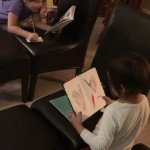Parent-teacher conferences were this week. Usually, it’s a parade of star students with doting parents walking from teacher to teacher to receive their accolades – or the opposite: students with single digit grades, their parents droning, threatening cell phones, video game systems, friends, freedom.
But this time something stood out. Something I feel warrants further scrutiny.
A mother walked up, eyes on her phone. “You don’t teach anything offensive, do you?”
No pretext, not even a hello first. The wheels in my head spun. Based on the way she asked the question, I knew that there was an obvious right and wrong answer. What she wanted me to say was “No, of course not. I will never in any way challenge the preconceived notions you have painstakingly crafted for your child. Your indoctrination will remain unblemished under my watch.”
What I actually said was, “Ma’am, if I’m not being offensive, I’m not doing my job.”
She did not like that answer, but that’s not the point. I was being honest. I truly do feel that offending students is so integral to my teaching that to remove it would destroy the entire operation of learning. I understand what it means to say this, and so should probably explain myself.
Think of it like a tree: a sapling growing in the wrong direction hurts itself and limits its future health and growth potential. If staked, the tree can grow larger and stronger. But the act of staking certainly must be horrible to the tree; without knowledge of the purpose behind it, it must feel like needless torture.
I think of human growth in similar terms, though in the abstract. Ideas, emotions, and experiences can all be staked in myriad ways, though my specialty and focus is in literature. Sometimes these ideas, emotions, and experiences are difficult to comprehend. Sometimes they are unpleasant. Other times they can downright hurt; but it’s always to ensure the future growth potential of my students. I’m not molding them, or creating them, or imbuing them with my (or any other intellectual boogeyman’s) values ; I am simply giving them the tools necessary to build a foundation upon which they can create and recreate their own intellectual framework, now and for the rest of their lives.
The problem, as usual, is one of perspective. We all see the world as individuals, looking from the inside outward. We can never truly understand reality outside of ourselves, but only interact with it through the buffer of our idiosyncratic interpretation, much like these fine gentlemen.
To stick with the metaphor: if at any point we cease to exercise our gloves of interpretation, the rubber will become brittle, cracked, hard. It will lose pliability, and therefore be less capable of interacting with reality. When stretched too far, sometimes our mechanisms of interpretation can even break – so we must take care not to stretch too far. And the margins of what defines “too far” begin to narrow. Smaller and smaller. And the mind grows complacent, and pleasantly congeals.
This complacency eventually terminates in solipsism. It is not an intentional self-centeredness, but rather an atrophying of the mechanisms through which we interact with the world outside of ourselves. This includes others, most of whom have also fallen into their own private accidental solipsism. The result, then, is a group of individuals. Strangers in a crowd arranged like dots – disconnected, static.
Collectively, our mechanisms of interpretation are breaking down. As anyone who has ever had to endure physical therapy will readily tell you, repairing any organic mechanism is a slow and painful process – like staking a tree. Like encountering an idea or concept so far removed from our own way of thinking that it shocks us, moves us deeply, is “an axe for the frozen sea inside us”. Offense is the pain we feel as we grow. It is the friction between how we perceive the world, and the world as it really is. If we view offense as an evil to be avoided, we will slip even further into anomie. But if we view it as an obstacle to be understood, overcome, then anything to which we take offense becomes an opportunity for growth – a new way of seeing the world, even if that way may be upsetting or vile to us.
The act of being offended is itself not a cause for action, it only shows attentiveness; and we desperately need to pay attention.









Comments 1
I don’t know how I’d answer that question….maybe a “You signed that you read my syllabus, so you tell me.” I find conferences so tiresome, focused on grades vs learning. I try so hard to focus on what the kids know and what they need to work on, but it always comes back to what assignments are they missing that can bring their grade up. Spending the next 3 days doing zoom conferences, so fingers crossed for less hostile reactions than what you got.